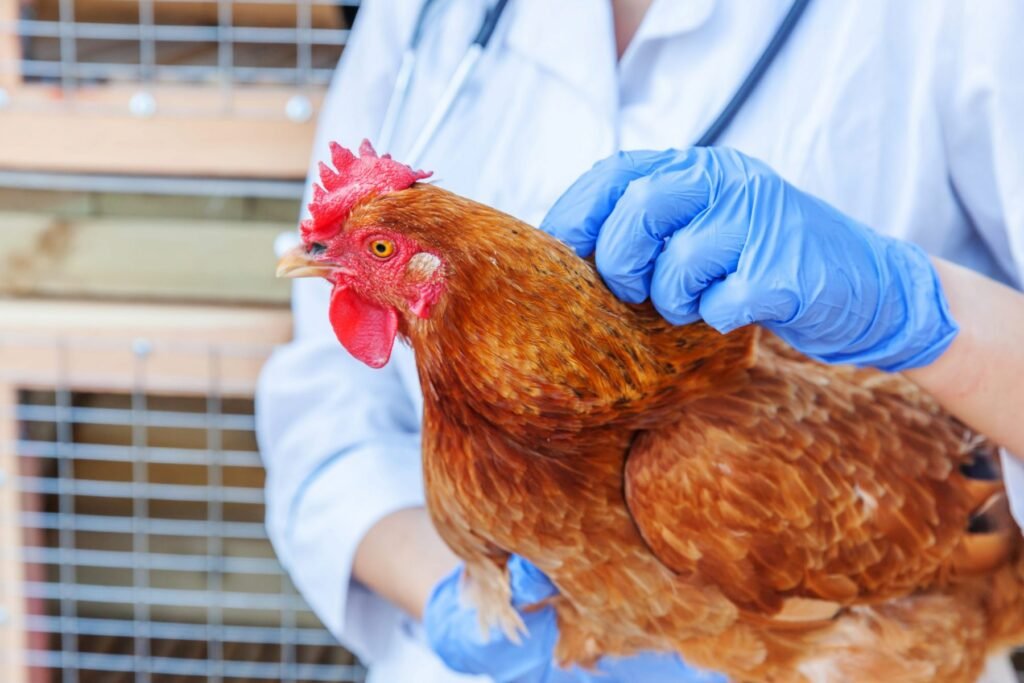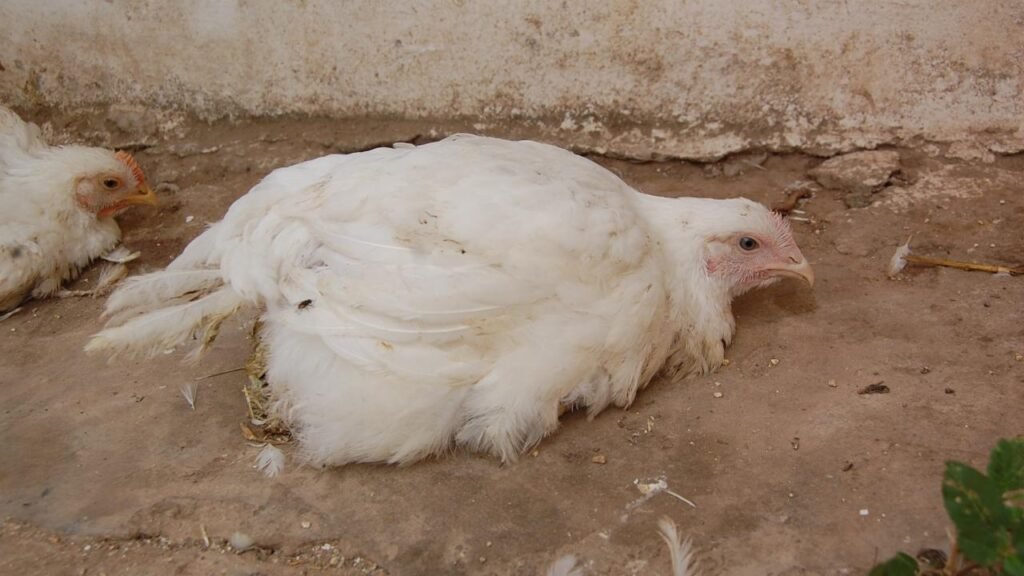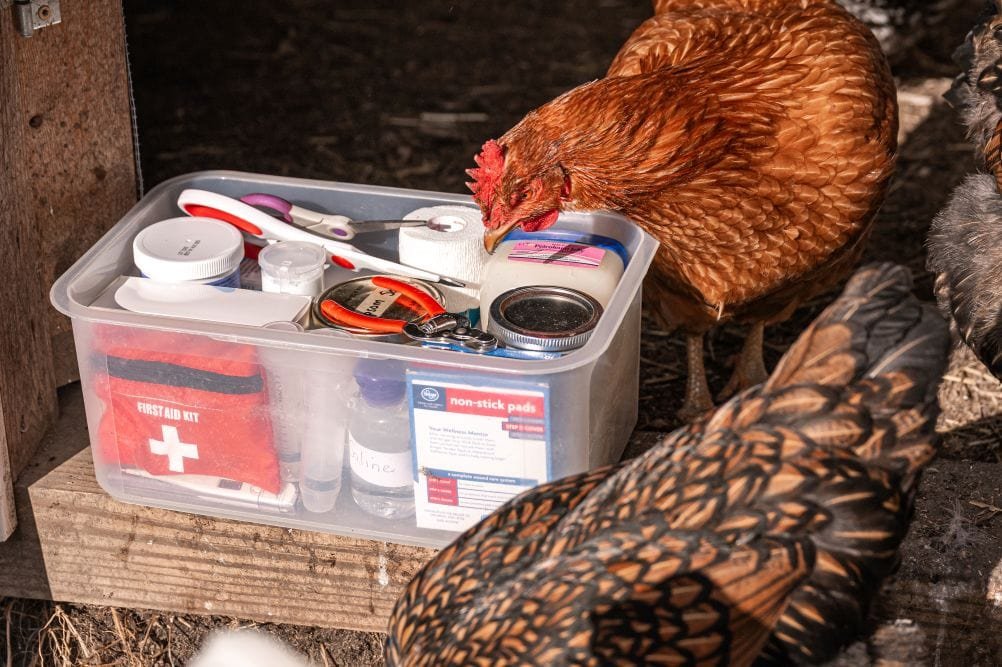It’s a question every backyard chicken keeper eventually asks themselves while looking at a sick bird: “Is this serious enough for a vet?” The uncertainty can be stressful, especially when you feel like your flock’s health rests on your shoulders. This guide is designed to help you make that call with confidence. It will provide a clear, logical framework for deciding when to provide home care, when to seek immediate veterinary attention, and what to do once you’ve made that decision.
VETERINARIAN DISCLAIMER:
Important: This guide is designed to help you make an informed decision. It is not a substitute for professional veterinary advice. Always consult a qualified veterinarian for an accurate diagnosis and treatment plan for your flock.
The First Step: A Quick Triage
Before you panic, take a moment to assess the situation. Is this a minor issue that requires observation and simple home care, or is it a clear sign of an emergency? This quick triage will help you determine your next move.
Scenarios for “Wait and See” with Home Care
Not every symptom requires a vet visit. These are situations where you should isolate the chicken and provide supportive care in a quiet, safe space with food and water and observe them closely for 24-48 hours.
- A slight limp with no visible wound or swelling: This could be a minor sprain or a temporary issue. Watch for improvement and ensure the chicken can still roost and move easily.
- A single sneeze or cough with no other respiratory symptoms: A single respiratory sound is common and could be caused by dust or a temporary irritant. Observe for any repetition, wheezing, or nasal discharge.
- Mild lethargy after a stressful event: Chickens may seem tired or less active after a scare from a predator or an extremely hot day. Ensure they have access to shade and fresh water.
- A temporary decrease in appetite that resolves quickly: A day of eating less might not be a concern, but if it continues, it could be a sign of a more serious issue.
If the chicken’s condition worsens, or if they develop more serious symptoms, it’s time to re-evaluate and move to the “call the vet” category.
Scenarios for “Call the Vet Now”
These are emergencies that demand immediate professional attention. Do not wait to see if these symptoms improve. The sooner you act, the higher the chance of a positive outcome.
- Major bleeding that won’t stop with pressure: This indicates a severe wound, potentially from a predator or an object in the run.
- Inability to stand or severe loss of balance: This can be a sign of severe trauma, neurological damage, or a critical systemic infection.
- Gasping for air or a rattling sound in their chest: These are classic signs of severe respiratory distress, which can cause suffocation and death if not treated immediately.
- A visible broken bone or severe trauma: These injuries are extremely painful and can lead to shock and infection.
The ability to quickly distinguish between a minor ailment and a true emergency is the first and most important step in protecting your flock. Once you know a situation is serious, the next step is identifying the specific red flags that demand professional attention.
The Red Flag Checklist: 10 Signs That Demand a Vet’s Attention
This is the core of your decision-making process. If your chicken exhibits any of the following signs, it’s a “call the vet” situation. These symptoms often indicate a problem that is either life-threatening or requires specialized knowledge to diagnose and treat.
- Severe Respiratory Distress: Gasping, open-mouthed breathing, gurgling sounds, or a rattling chest are classic signs of a severe respiratory infection, which can be caused by viruses or bacteria. A vet can prescribe the correct medication and help improve the bird’s breathing.
- Neurological Symptoms: Seizures, wry neck (a head twisted upside down or to the side), inability to stand, or extreme loss of balance all indicate a serious underlying neurological issue. These can be caused by diseases like Marek’s or Avian Encephalomyelitis, or by an ear or brain infection. A vet is needed for diagnosis and a treatment plan.
- Major Trauma or Uncontrolled Bleeding: Deep wounds from a predator attack, broken bones, or any bleeding that doesn’t stop with applied pressure requires immediate medical intervention. A vet can suture wounds, set bones, and provide pain relief.
- Signs of Severe Infection: A limb or joint that is hot, swollen, and painful to the touch could be a sign of a systemic (body-wide) infection that can quickly become fatal. Bumblefoot, for example, can become systemic if left untreated.
- Egg-Related Emergencies: A suspected egg-bound hen (waddling, straining, or a firm lump felt in her abdomen) or a prolapsed vent is a medical emergency that requires prompt care to save the hen’s life. A vet can safely remove the egg and re-position the vent.
- Sudden, Unexplained Deaths in the Flock: This is a major red flag for a highly contagious disease. You need an immediate professional diagnosis to protect the rest of your flock and prevent the spread of the illness to other farms. A vet can perform a necropsy to determine the cause of death.
- Inability to Eat or Drink: A chicken that has not eaten or had water for more than 24 hours is in serious trouble. Dehydration and malnutrition can cause a rapid decline in health. This can be caused by a blockage in the crop or a severe illness.
- Suspected Poisoning: If you suspect your chicken has ingested something toxic, such as lead paint, chemicals, or poisonous plants, you need to seek veterinary care immediately.
- A Condition That Worsens Despite Home Care: You’ve been treating a minor issue for 2-3 days, and it’s getting worse, not better. This is a sign that the problem is more serious than you initially thought and requires a vet’s intervention.
- Any Condition You Cannot Identify: If you don’t know what’s wrong, you can’t treat it effectively. A diagnosis from a professional is key to a successful recovery.
Once you’ve identified a symptom that requires a vet’s attention, the next challenge is knowing how to find the right professional and prepare for the visit.
You’ve Decided to Call. Now What?
Once you’ve made the decision to call a vet, knowing what to do next is crucial. This section helps you with the logistics of getting your chicken the care it needs.
How to Find a Chicken-Savvy Vet
Finding a veterinarian who treats chickens can be challenging. Here are the best ways to find one:
- The Association of Avian Veterinarians (AAV): Use their “Find a Vet” tool to locate veterinarians who specialize in birds. This is the gold standard for finding a professional with the right expertise.
- Call Local Vet Clinics: When you call, ask if they have a vet experienced with “backyard poultry” or “exotics.” These phrases are more likely to get a positive response than just asking if they see “chickens.”
- Contact Your State’s University Extension: Many university extension offices have poultry specialists who can provide advice or refer you to a local vet.
How Much Does a Chicken Vet Visit Cost?
Be prepared for the cost. A basic exam can range from $50 to $100. Diagnostics like x-rays or blood work, plus any medication or procedures, will add to the cost. Being honest with your vet about your financial limits can help them prioritize treatment options.
How to Prepare for the Vet Visit
To help your vet make a quick and accurate diagnosis, come prepared.
- Call ahead to confirm they see chickens and to let them know you’re on your way.
- Transport the chicken in a secure carrier with fresh bedding.
- Bring a fresh fecal sample. This is crucial for diagnosing internal parasites.
- Take photos or videos of the symptoms (e.g., a hunched posture, difficulty breathing) and the coop environment.
- Write down a timeline of the illness, including when symptoms started and any home care you’ve attempted.
Now that you’re prepared for a vet visit, let’s address some of the most common health questions that come up for backyard chicken keepers.
The Big Health Questions: Antibiotics, Vaccines & Deworming
These are common topics of concern for chicken keepers. Here is some information to help you have an informed conversation with your vet.
Do Backyard Chickens Need Antibiotics?
Antibiotics are powerful, prescription medications for treating specific bacterial infections. You should never administer “leftover” antibiotics from other animals or for different conditions, as this can be ineffective and contributes to antibiotic resistance. A vet can diagnose the specific infection and prescribe the correct medication and dosage, ensuring it’s the right choice for your chicken and for preventing resistance.
Do Chickens Need Vaccines?
Most commercial chicks are vaccinated for Marek’s Disease before they are shipped. This is a highly contagious viral disease with no cure, and it’s why the vaccine is so important. Other vaccines are available but are often not practical for small backyard flocks unless there is a specific, diagnosed risk. This is a conversation to have with a vet, as they can help you assess the risks of common diseases in your area, such as Fowl Pox or infectious bronchitis.
When Should I Start Deworming Chickens?
The best practice is to have a fecal test performed by a vet to confirm a worm infestation. A fecal float test can identify the eggs of specific parasites like roundworms, tapeworms, or cecal worms. Once confirmed, your vet can recommend the correct dewormer for the specific type of parasite. Routine deworming without cause is not recommended because it can be ineffective and lead to drug resistance.
Biosecurity: Preventing the Spread of Disease
Biosecurity is the practice of protecting your flock from disease. It’s a critical part of being a responsible chicken keeper.
- Isolate New Birds: Always quarantine new chickens for at least 30 days before introducing them to your existing flock.
- Clean & Disinfect: Regularly clean and disinfect your coop, feeders, and waterers.
- Control Pests: Keep rodents and wild birds away from your flock, as they can carry and transmit diseases.
- Restrict Visitors: Limit visitors’ access to your coop to prevent the introduction of outside germs.
By taking these preventative measures, you can dramatically reduce the chances of your flock getting sick in the first place.
Frequently Asked Questions (FAQ)
Q: How can you tell if a chicken is in pain?
A: Signs include hiding from the flock, reluctance to move, limping, a hunched posture, closed eyes, and changes in vocalization, such as grunting or a lack of vocalization altogether.
Q: What can you give a chicken for pain relief at home?
A: Do not give human painkillers like Tylenol or Advil, as they can be toxic. A veterinarian can prescribe a safe and effective pain reliever for poultry, such as Metacam, to ensure your chicken is comfortable while healing.
Q: Can you take a hen to the vet?
A: Yes, absolutely. Chickens are considered companion animals by many vets. Many veterinarians, especially those who treat exotic pets or have a rural practice, are happy to see chickens.
Q: How often do chickens need to drink water?
A: Chickens need constant access to fresh, clean water. An adult chicken can drink up to a pint of water a day, and more in hot weather. Dehydration is a serious health risk.
Conclusion: Your Role as a Responsible Flock Manager
Being a responsible chicken keeper isn’t about knowing how to treat everything yourself; it’s about knowing your limits and when to call in a professional. The decision to seek veterinary care can feel daunting, but it’s an essential part of keeping your flock healthy and happy.
Trust your instincts. If you feel something is seriously wrong with your chicken, making that call to a vet is the best and most compassionate choice you can make for your flock.


